services forms the backbone of the public transport system, complementing the rail network and providing essential connectivity to all corners of the island. The public bus network is vital to Singapore’s transport policy, which promotes a car-lite society, with a robust bus network essential to achieving this goal.
In 2023, public buses in Singapore recorded around 3.75 million passenger trips daily, across 350 bus services. As of May 2022, the public bus fleet comprises around 5,800 buses with an average age of eight years.
Currently, public bus services are operated by four main bus operators (SBS Transit, SMRT Buses, Tower Transit, Go-Ahead) under the Bus Contracting Model (BCM). Under this model, the Land Transport Authority (LTA) (and by extension, the Government) retains ownership of all bus assets, including buses, infrastructure, and systems. Operators are contracted through a tendering process to operate, manage, and maintain these assets. Bus fares are charged based on distance travelled, and are also regulated by the Government.
In addition to these services, private bus operators offer Premium services and other Shuttle Bus services which further enhance the accessibility and convenience of public transportation options in Singapore.
Types of Public Bus Services
Trunk & Feeder Bus Services
Main Article: Basic Bus Services
Trunk services are the main arteries of Singapore’s public bus network, running long routes that connect various neighbourhoods and towns across the island, including routes into the city areas.
Feeder services, on the other hand, operate within specific neighbourhoods. Typically based out of bus interchanges with rail connections, these services provide crucial links within housing estates and play a pivotal role in Singapore’s hub-and-spoke transport system, which prioritises the rail network for long-distance trips, and buses for last-mile connectivity.
Some feeder services also operate in a dual-loop fashion (formerly known as Townlink or Intratown services). These routes serve as feeder services between neighborhoods and the town centres, while also connecting different neighborhoods within a town, eliminating the need for bus transfers at the interchange.
Operating alongside these basic bus services are route variants introduced to ply variants of their parent trunk routes, usually indicated by an alphabetical prefix or suffix attached to bus service numbers. Common ones used include A, B, and C for Short-Trip Services, M for ‘Modified’ / Route Variants, T for Terminating trips of Feeder services, and X for express feeder variants. A full list of these services can be found at Bus Service Prefixes and Suffixes.
Several types of bus routes that are subsets of trunk/feeder routes are:
- Short-Trip Services: Shortened versions of trunk/feeder routes
- Cross-Border Services: Connecting Singapore and Johor Bahru
- Jurong Industrial Services: Serving Jurong Industrial Estate (branding largely defunct)
- Limited-stop Peak Period Bus Services (formerly known as Express Feeder Services): Provides a faster connection than regular feeder bus services
Public buses are also deployed on Rail Replacement Services during extended rail disruptions.
Express & City Direct Bus Services
Main Article: Express Bus Services / City Direct Services
Express Services are designed with express sectors that involve skipping certain bus stops or utilizing expressways, resulting in shorter commuting times compared to regular trunk services. These services charge express fares due to their added convenience and time-saving benefits.
City Direct Services, on the other hand, operate during weekday peak hours between major residential estates and the Central Business District (CBD). These services charge express fares, and offer commuters an alternative to existing public transport connections to the CBD.
Employee bus services are for public transport workers and not for the general public.
Private Bus Services
Private bus services are run by private bus operators according to set timetables and routes. They enhance the public transport network by meeting specific transportation requirements, such as transporting commuters to workplaces or leisure destinations. These services are regulated by LTA under a Class 2 Bus Service Licence.
Premium Bus Services
Main Article: Premium Services
Premium Bus Services typically ply between major residential estates and key industrial/commercial nodes such as the Central Business District (CBD) or Industrial/Business Parks during peak hours. Designed to ease the rush-hour crowd, Premium Bus Services charge a premium fare but offer a more direct connection as compared to existing public transport options. Premium Bus Services are operated by private bus operators based on commercial considerations.
Shuttle Bus Services
Main Article: Shuttle Bus Services
Shuttle Bus Services are provided to meet specific transportation needs, including connections to places of interest, tourist attractions, commercial or retail centres, and medical institutions. These services are typically run by private bus operators and may operate either as fare-collecting or free shuttle services.
Regions with internal shuttle bus networks include Changi Airport, NUS/NTU university campuses, and Sentosa Island.
Cross Border Services
Private buses also operate cross-border bus services, connecting Singapore and Johor Bahru. More at Cross-Border services.
Scheme B Bus Services
Main Article: Scheme B Bus Services
Scheme B Bus Services (complement existing basic bus services by providing additional capacity primarily during peak hours. These services are provided by private bus operators, such as private-hire or school bus operators. These services are not well-known owing to low outreach and infrequent departures.
Legacy Services
Several categories of public bus services that have been discontinued since the 2000s include NightRider, Nite Owl, Parks, Chinatown Direct, Bus Parallel Service, Cityshopper, Citybuzz, SMRT Nightbus, Stadium Direct and City Shuttle Services.
Services discontinued before the 2000s include SBS Blue Arrow services, National Stadium special services, CBD special services, and SS-prefixed temporary shuttle services.
References:
- LTA | Bus [Accessed 4 Jun 2024]
- LTA | Bus Network [Accessed 4 Jun 2024]
- LTA Public Transport Statistics [Accessed 4 Jun 2024]
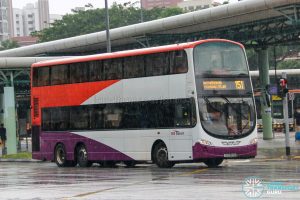
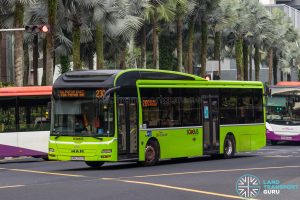
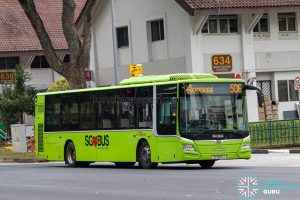
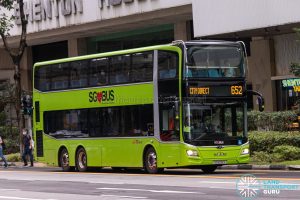
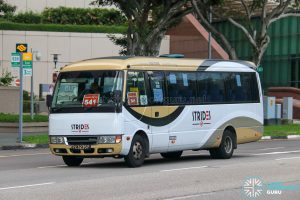
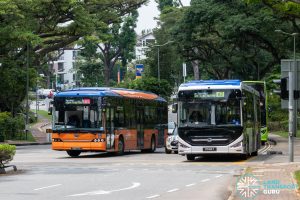
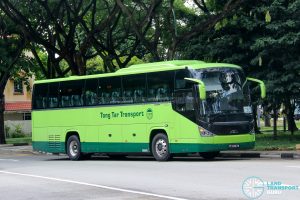
That day on 30 June 2022, R.I.P for night, chinatown direct, resort world and 926. As if bus heaven wasnt so crowded enough
I feel that SBST upgraded their bus services today (Wed 9 Feb) 2022
Service 8: 2 MAN A95s
Service 28: 2 MAN A95s
Service 31: 2 MAN A95s
Service 56: SBS 3736S (Volvo B9TL Wright)
(Forgot busplate) Mercedes-Benz 0530 Citaro
Service 57:
SG 1037B (Mercedes-Benz 0530 Citaro)
SG 1038Z (Mercedes-Benz 0530 Citaro)
Service 88:
SG 5368U (Volvo B9TL Wright) (Chingay50)
Service 90:
(Forgot busplate) (MAN A95)
Service 231:
SBS 6799X (Mercedes-Benz 0530 Citaro)
Service 238:
(Forgot busplate) (Mercedes-Benz 0530 Citaro)
can introduce bus 921 starting from Gali Batu looping at BPITH
As for now SMRT park service 61,75,172,184,983,985 & 991 @ Bulim Depot.
Service 180,188/e,920,922,970,971,972/M,973 & 979 @ Woodlands Bus Park.
If only the Yutong SDs/DDs deploy on 61 & 172 then 75 & 184 can park @ WLBP in exchange with 180 & 188/e.920 & 922 can park back at Kranji Depot exchange with service 975.
ev bus can last that long on route 61 meh
It has been like 10 months since there is a new unique service (e.g 146) (in this case 384)
They actually introduced 801 last year, and it plys in Yishun
146 was introduced in early 2024